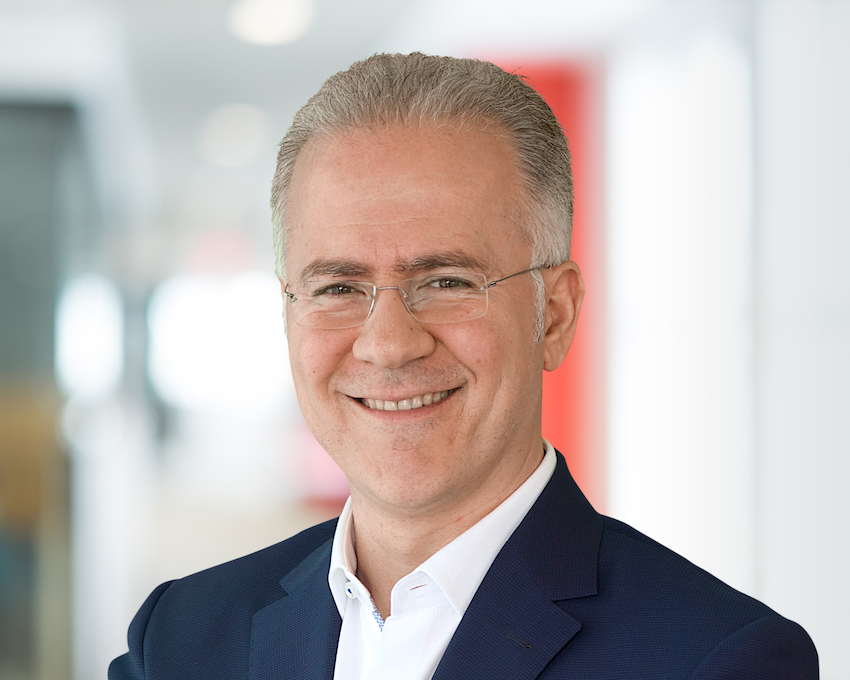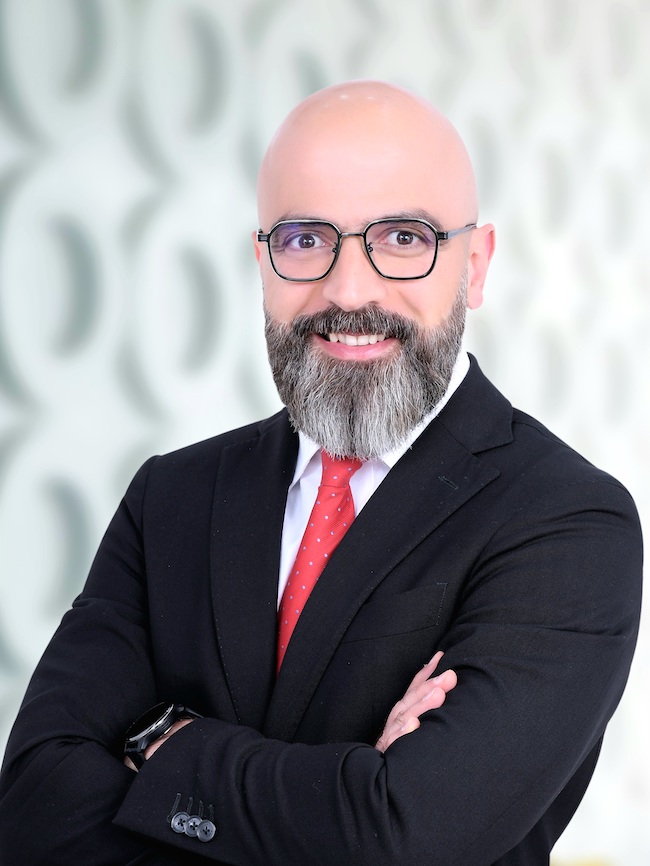KING ABDULLAH ECONOMIC CITY: Ahmed Linjawy looks on proudly as top international players tee off at the meticulously manicured golf course at Saudi Arabia’s King Abdullah Economic City (KAEC).
He’s not the only one watching. The world’s media cast their not-uncritical eye over the European Tour event, which coincided with a high-profile and even higher-pitched performance from Mariah Carey.
As chief executive of the Riyadh-listed developer of the city, Linjawy has been key in building facilities designed to attract golfing greats, pop princesses and big business.
King Abdullah Economic City or KAEC (pronounced “cake”) is bigger than Washington D.C., spanning about 181 million square meters, as the marketing people are keen to point out.
Situated about 100 km north of Jeddah, the city comprises the King Abdullah Port, coastal residential communities, an industrial zone and the new Haramain Railway link.
Two things become clear on the long drive from the zone’s brightly illuminated main gates to the golf course: KAEC is big, but it’s still mostly desert.
Yet as golfing legend Ernie Els, and top-ranked Saudi golfer Othman Almulla, get into the swing of things, Linjawy expands on his vision for the economic zone and how a great city is emerging from the sand.
“For us it is a historic moment,” the 50-year-old Saudi national says.
--------
BIO
CAREER
•Appointed group CEO of Emaar, The Economic City in late 2018.
•Formerly deputy chief executive, and president of industrial and city services.
•Has worked for the company, which develops King Abdullah Economic City, since December 2006.
•Previously an executive in Procter & Gamble, where he worked for 16 years in various roles including country manager for Saudi Arabia.
EDUCATION
•Bachelor of science in medical technology, King Abdul Aziz University.
•Certifications from the London Institute and the American University, Washington D.C.
--------
“We’re hosting the first-ever golf tournament in Saudi Arabia, and it’s a tournament at an international scale … this is what King Abdullah Economic City is now capable of doing.”
Linjawy is in a richly upholstered room at The Oryx private members club, part of the the Royal Greens Golf & Country Club, the 18-hole championship course where the European Tour event is played.
The room, though relatively new, smacks of old-school grandeur. It is the sort of place where you might purposefully lose a game of pool to your father-in-law, or pretend to understand the golf handicap system.
The clubhouse is bustling on the first day of the Saudi International, part of a three-year agreement with the European Tour to hold a golfing event in the Kingdom. That agreement is likely to be extended, says Linjawy, while other leisure events are planned.
After the Carey gig, other concerts — which were a rarity in Saudi Arabia until recently — are in the pipeline for KAEC.
An international motor-racing event and even a fishing tournament are in the works, the latter making sense due to the city’s Red Sea coastline and marina facilities.
Such events will be key to Linjawy’s ambitious target to boost the number of visitors to KAEC, which pulled in almost 500,000 tourists last year. He says the zone aims to attract a million tourists in 2019 through events such as the European Tour, during which he expects to see about 100,000 visitors alone. A system to make it easier for foreigners to obtain Saudi entry visas to visit KAEC will be introduced this year, Linjawy says, with the new high-speed Haramain Railway whisking them from the new terminal at Jeddah airport.
Yet boosting visitor numbers through glittering concerts and multimillion-dollar sports events are just one aspect of what KAEC is about. The city has other activities in areas such as logistics, business, manufacturing, entrepreneurship and residential property.
Notably, KAEC is home to King Abdullah Port, which Linjawy says aims to be one of the world’s largest shipping hubs with a possible share sale set to fund its expansion.
We want to be a global hub for logistics and light manufacturing.
Ahmed Linjawy
“To kickstart some of the future projects, we will need other sources of funding. We’re going more and more into project financing for specific projects — an IPO for the port — and some of our other businesses as well,” Linjawy says.
“The vision for the port is to be among the largest in the world. We have the funding and the plans to make it the largest in the Middle East for sure, but (to make it among the biggest) in the world we will certainly need a lot more capital.
“We want to be a global hub for logistics and light manufacturing, and this is where the port comes and the entire industrial and logistics zone come into play.”
Such facilities complement the presence of international companies including pharmaceuticals firms Pfizer and Sanofi, as well as confectionary giant Mars, at KAEC.
“(For) those names and others, this is their first manufacturing presence in Saudi Arabia, if not in the Middle East in some cases,” says Linjawy.
Other items on Linjawy’s agenda include pursuing discussions with a data-center provider, which he does not name, to set up in KAEC.
Another is building the city’s startup scene, which benefits from the presence of the Prince Mohammed bin Salman College of Business and Entrepreneurship, which was set up in KAEC through a partnership with a subsidiary of Babson College in the US.
Linjawy even believes that Saudi Arabia’s first “unicorn” — the term describing a privately held startup company valued at more than $1 billion — could emerge from KAEC.
“We are looking that big, for sure,” he says. “Part of our objective here is to create jobs, opportunities and offer the environment for creativity and innovation. We’re not just looking at it on a small scale, we want this to be a destination, a hub for startups, and for Saudi Arabia, for the creative people … to invest or experiment.”
Creating a city bigger than Washington DC does, of course, come with challenges. First announced in 2005, King Abdullah Economic City was envisioned as having an eventual population of 2 million people. Yet as of today it only has about 10,000 full-time residents.
Linjawy is not perturbed by this — and is sanguine about KAEC’s future growth prospects.
Everybody has been able to see the real Saudi Arabia, the hospitality, the culture itself.
Ahmed Linjawy
“What was communicated back then (in 2005) was more of a vision and inspiration that this was going to be developed in a few years,” he says.
“But that would have been almost impossible unless you wanted to compromise on quality. It has had its challenges, no question about it, but nothing extraordinary.”
Priorities now include growing tourism and leisure, and building a business community around KAEC’s new train station.
“(What is) really important is for this to be — and continue to be, more so — a place for Saudis to start their businesses, start their new life as well, new family, a place for hope and the future,” Linjawy says.
The eloquent, urbane Linjawy has worked for Emaar, The Economic City — the company developing KAEC — since 2006, the year it was listed on the Saudi stock exchange. He took over as acting CEO in September, a position confirmed as permanent three months later.
His transition into the CEO role came at the same time as the public furor over the murder of Saudi journalist Jamal Khashoggi at the Kingdom’s consulate in Istanbul last October.
Some of the global media coverage of the golfing tournament has referenced the murder of Khashoggi. Yet despite some negative headlines, Linjawy remains confident that the tournament will give a boost to Brand Saudi Arabia.
“I think you can see the vibe already, we have 130 players from all over the world, so many guests coming also from different places,” he says.
“Everybody has been very positive, and they have been able to see … the real Saudi Arabia, the hospitality of the Saudis, the culture itself.
“It is (about) the people who were here and (what they) say about Saudi Arabia, that’s what really matters — testimonies.”
A small crowd gathers to watch world golfing stars make their European Tour Saudi debut. It must be the most high-profile event to be staged at KAEC in all of Linjawy’s 13 years working there. “I’ve seen it all,” he says of his time helping develop the city.
And as Ernie Els and Othman Almulla tee off, he can be sure there are many rounds still to be played.

























